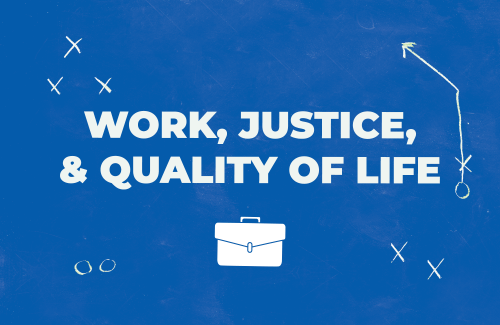A Work, Justice, and Quality of Life Agenda
Equal Opportunity for All South Carolinians
These 16 recommendations are drawn from the Palmetto Promise Playbook report. You can view our policy agenda for other issues by clicking below.
Education | Energy | Healthcare | Tax & Budget
CRIMINAL JUSTICE & QUALITY OF LIFE
- Reform South Carolina’s unjust municipal court fines and procedures which disproportionately impact the poor. According to the conservative Institute for Justice’s analysis, only three states soak the poor more than South Carolina with fines and fees.
- Take a hard look at how we select judges, particularly Summary Court Judges (Magistrates). Investigative reporting in recent years has raised significant questions about the qualifications of Magistrates. This is important, because as a practical matter, the Summary Courts are those in which most South Carolinians come seeking justice. A review (and possible reform) of South Carolina’s judicial selection process, and even of the governing procedures and practices of the courts themselves, are warranted to truly ensure “equal justice under law” for every citizen in our state.
- Overcome the barriers to civil asset forfeiture reform that arose in the last legislative session and send a bill to the Governor’s desk immediately. In too many cases, law enforcement can take property without its owner being convicted of any crime. It is known as “policing for profit,” and we should not incentivize it or force a resort to it, but rather fund law enforcement straight up in the state budget.
- Embark on a “Round 2” of payday loan industry reforms to prevent predatory practices. The payday loan industry met with some sorely needed reforms a decade ago, including the institution of a database that would prevent borrowers from taking out overlapping loans at competing lenders all over town. But more needs to be done to control fees to prevent borrowing from becoming a trap. The payday loan industry met with some sorely needed reforms a decade ago, including the institution of a database that would prevent borrowers from taking out overlapping loans at competing lenders all over town. But more needs to be done to control fees to prevent borrowing from becoming a trap.
- Think hard about the customers versus the beneficiaries of the South Carolina Education Lottery. Think hard about the customers versus the beneficiaries of the South Carolina Education Lottery. Study after study has found that those who play the lottery, and provide the prof- its to fund education programs, seldom receive benefit from it. In a “reverse Robin Hood,” the poor play the lottery to send middle-class kids to college… and colleges are tempted to raise tuition knowing lottery funds are available to cover the increase.There are others outside of those we addressed in The Greenville News…
- We can continue our role as a leader in stopping overcriminalization as we make our way down the road to broader criminal justice reform.
- We should not detain juveniles in adult jails or try them in adult courts for juvenile offenses. Speaker Jay Lucas has appointed a House Equitable Justice System and Law Enforcement Reform Committee headed by Reps. Gary Simrill and Todd Rutherford. We look forward to their findings.
- Removing barriers to hiring can be a de facto civil rights issue as well. “Barriers to Hiring” is a policy area deserves its own section because of the depth and breadth of its implications…
BARRIERS TO HIRING
- Adopt a Small Business Regulatory Flexibility Act modeled on statutes from other states to see that small businesses are not overly burdened by state regulations.
- Protect Right to Work. Under a Biden Administration, South Carolina may have to once again fight to protect our right to work law from National Labor Relations Board (NLRB) intervention. It would be worth the fight to prevent a federal regulatory board from redefining its role in such a way as to allow it to unfairly take the side of labor unions against worker freedom.
- Prevent excessive Workers’ Compensation contributions/rates. One-time federal funds should be used to replenish the trust fund and keep rates low. South Carolina was one of the worst states to start (or bring or expand) a business in terms of Workers’ Comp expenses just a short time ago, but thanks to independent analysis from economists like Dr. Rebecca Gunnlaugsson, our system has improved dramatically. The most recent ranking (2018) shows South Carolina now in the next to lowest rate category. We must continue to be vigilant.
- Finish reforming the business license system by implementing new legislation according to the intent of the Business License Tax Standardization Act. The bumper of a contactor’s truck is a testament to the maze of licenses required to operate in a reasonable geo- graphic area…and please, no more municipalities roughing up kids mowing lawns to get a business license.
- The Department of Labor, Licensing and Regulation (LLR) should study existing licensing barriers to work and the legislature should eliminate job-killing and unnecessary hoops. The fast tracking of military spouses for occupational licensing reciprocity was a great win for the state and for all those who want to work. In the last session of the General Assembly, the House passed a bill opening up the market by allowing mobile barbershop permits. But it died in the Senate. That was unfortunate. Why must hair be cut in a shop? Arizona has put people back to work with the Breaking Down Barriers to Work Act which broadly recognizes out-of-state occupational licenses. Twenty states have introduced similar bills and many have passed it.
- COVID has also forced many South Carolinians to work from home or to start home-based businesses which deserve protection. The Home-Based Business Fairness Act would require that home businesses operate safely, but would provide protection against harassment or lengthy permitting processes for certain kinds of home businesses. South Carolina has a law for cottage food industries, the Home-Based Food Production statute, but it has many unnecessary restrictions that could be removed to open up the home-based economy. Another boost to start-up businesses is business crowdfunding, a law that allows small businesses a new mechanism to allow individuals to invest in businesses without triggering federal or state securities regulations and laws. Renting a room in your home is also a home-based business! Local ordinances vary, but Charleston has been singled out for targeting short-term rentals. Formerly banned in The Holy City, short-term rentals are now “only” strictly regulated. The state may need to bolster private property rights with a Home-Sharing Act that would focus on bad actors not responsible homeowners. (A version of the Act was introduced in the most recent session of the General Assembly.)
- Pass meaningful tort reform and COVID-19 liability protections for suffering small businesses. To-date, the South Carolina General Assembly has taken no action to protect businesses from aggressive trial lawyers seeking to cash in on COVID-19. South Carolina is one of only three southern states that has not passed some type of COVID-19 liability protection.
- Publish clear guidelines for future regulatory takings, such as the COVID shut-down, so that businesses can be compensated for government-ordered economic suppression.





